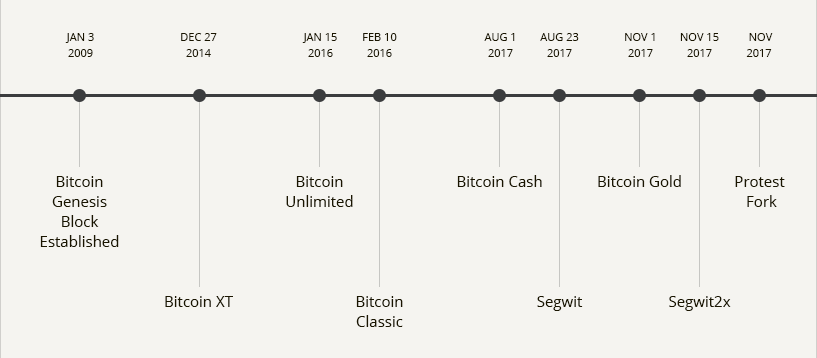What is Bitcoin fork?
A fork is a modification of the computer code governing the Blockchain. There are two types of forks easily distinctive. The first version, the most widespread, is a soft fork. The second is called a hard fork.

A fork is a modification of the computer code governing the Blockchain. There are two types of forks easily distinctive. The first version, the most widespread, is a soft fork. The second is called a hard fork.

The Blockchain is governed by consensus protocols. All decisions are made collectively by vote. The Bitcoin community is an open community with a place for all, without distinction. Its membership is done by downloading an open source protocol software. All these members are grouped around a code that they must respect under penalty of being out of sync, ie excluded from the network.
However, this code is not something immutable or engraved in stone. It is scalable, if approved by the network. The consensus is a necessity to maintain unity, guarantee the legitimacy of transactions and value all the different coins or tokens. The same is true for traditional fiduciary currencies. They have only a numerical value which is justified by the fact that everyone is ready to accept it as a means of payment. If it’s not, the network effect comes into play. Subnetworks considered as useless are bound to disappear, contrary to the changes deemed to be a service of general economic interest.
Each participant is free to make a proposal. However, to be accepted, it must be approved by a minimum of 75% of the network, in general (the more, the better). Thanks to this method, it is extremely complicated for an individual to propose a modification with a personal interest only because there is no government or central bank to impose his authority, which reduces to nothing Corruption attempts. In addition, all participants are spread over the four corners of the globe, speaking different languages and having different cultures. That means a modification must necessarily have a collective interest to have a chance to be accepted.
The expression of hard fork or soft fork is in no way related to the approval rate received by the modification, it depends solely on the nature of the modification:
A soft fork is a retro-compatible modification of the rules intended to make them more stringent. This becomes effective in case the majority of miners accept this change. Note that a soft fork is backward-compatible. This term means that old nodes will recognize the new blocks as valid. All new blocks must necessarily respect new rules to be validated. Those who will not be deemed compliant will no longer be validated by miners and therefore will be automatically excluded.

Thus, the use of the word soft indicates the compromise and insists that the network itself is not divided. There is no obligation to update the software and the minority that was against this change may continue to apply the old rules, provided that they do not conflict with the new requirements.
Conversely, a hard fork is a major protocol modification that leads to the division and the obligation for all participants to update or upgrade their software if they want to continue using this blockchain. Here, no backward-compatibility since the rules does not apply to the previous blocks.
The main advantage here lies in the fact that the code in its entirety can be changed (nb: old rules will no longer apply). We can change governance rules, rewrite transaction history and how to send and receive its bitcoins. Everything is possible. However, a hard fork is very constraining for all participants and it is therefore very difficult to obtain a broad consensus, resulting in a pure split and the creation of a parallel blockchain.
The success or failure of a hard fork lies mainly in the degree of conflict it generates when it is created. If the division is large, the network effect will quickly lead to its loss due to a lack of confidence. The value of a good lies first and foremost in the trust placed in it, and investors, even the most fervent, will always look for security from the network and the safest protocol is only the one that creates value.
 Bitcoin Forks Chronology – The Ultimate List of Forks
Bitcoin Forks Chronology – The Ultimate List of Forks
The significant first hard fork took place on August 1, 2017. The increase in block size is at the basis of the conflict. A group of developers wishing to return to the original size, that was originally "planned by Satoshi Nakamoto", 32 MB per block, and let the 1MB limit introduced in summer 2010 fall.
The purpose was to fight the growing cost increase and reduce the confirmation time in order to support the growth of user numbers. Indeed, 1 MB per transaction thus limits to 3 the number of transactions per second, which forces the actors wishing to close their transaction in priority to pay a tax estimated in Satoshi / bytes. In 2017, the Segwit solution proposed by the original protocol to help avoid this problem did not get the favors of this group of protesters, resulting in chain split and the creation of Bitcoin Cash (BCH).
The last one that took place is important, and once again with Bitcoin Cash. This time, two clans, ABC and SV, argue about the Satoshi Nakamoto's vision. The first of them wishing to instaure smarts contracts in the image of what is done on the Ethereum network, which according to the second actor, would be contrary to the vision of the founding father. This would threaten the stability of Bitcoin Cash.
It should be noted however that in this case, an ego war seems to rage which complicates the analysis of this hard fork.
| Name | Symbol | Blockchain | Fork Date | Fork Block | Coin Distribution |
|---|---|---|---|---|---|
| Bitcoin Cash Fork | BCH | Bitcoin | Tuesday, August 01, 2017 | 478559 | 1 BTC = 1 BCH |
| Bitcoin Clashic Fork | BCHC / B | Bitcoin | Tuesday, August 01, 2017 | 478558 | 1 BTC = 1 BCHC / B |
| Oil BTC Fork | OBTC | Bitcoin | Tuesday, August 01, 2017 | 498888 | 1 BTC = 1 OBTC |
| Bytether Fork | BTH | Bitcoin | Tuesday, August 01, 2017 | 478558 | 1 BTC = 1 BTH |
| Bitcoin Gold Fork | BTG | Bitcoin | Tuesday, October 10, 2017 | 491407 | 1 BTC = 1 BTG |
| Bitcoin Diamond Fork | BCD | Bitcoin | Friday, November 24, 2017 | 495866 | 1 BTC = 10 BCD |
| Bitcore Fork | BTX | Bitcoin | Thursday, November 02, 2017 | 0 | 1 BTC = 0.5 BTX |
| Bitcoin Nano Fork | BTN | Bitcoin | Friday, December 01, 2017 | 501888 | 1 BTC = 1000 BTN |
| Bitcoin Silver Fork | BTSI | Bitcoin | Friday, December 01, 2017 | 0 | 1 BTC = 1 BTSI |
| Super Bitcoin Fork | SBTC | Bitcoin | Tuesday, December 12, 2017 | 498888 | 1 BTC = 1 SBTC |
| BitcoinX Fork | BCX | Bitcoin | Tuesday, December 12, 2017 | 498888 | 1 BTC = 10000 BCX |
| Bitcoin Hot Fork | BTH | Bitcoin | Tuesday, December 12, 2017 | 498848 | 1 BTC = 100 BTH |
| UnitedBitcoin Fork | UB | Bitcoin | Tuesday, December 12, 2017 | 498777 | 1 BTC = 1 UB |
| Bitcoin World Fork | BTW | Bitcoin | Sunday, December 17, 2017 | 499777 | 1 BTC = 10000 BTW |
| Bitcoin Faith Fork | BTF | Bitcoin | Tuesday, December 19, 2017 | 500000 | 1 BTC = 1 BTF |
| Bitcoin Stake Fork | BTCS | Bitcoin | Tuesday, December 19, 2017 | 499999 | 1 BTC = 100 BTCS |
| Lightning Bitcoin Fork | LBTC | Bitcoin | Tuesday, December 19, 2017 | 499999 | 1 BTC = 1 LBTC |
| Bitcoin New Fork | BTN | Bitcoin | Monday, December 25, 2017 | 501000 | 1 BTC = BTN |
| Bitcoin Top Fork | BTT | Bitcoin | Tuesday, December 26, 2017 | 501118 | 1 BTC = 1 BTT |
| Bitcoin File Fork | BIFI | Bitcoin | Wednesday, December 27, 2017 | 501225 | 1 BTC = 1000 BIFI |
| Bitcoin God Fork | GOD | Bitcoin | Wednesday, December 27, 2017 | 501225 | 1 BTC = 1 GOD |
| Bitcoin SegWit2X x11 Fork | B2X | Bitcoin | Thursday, December 28, 2017 | 501451 | 1 BTC = 1 B2X |
| Quantum Bitcoin Fork | QBTC | Bitcoin | Thursday, December 28, 2017 | 0 | 1 BTC = 1QBTC |
| Bitcoin Ore Fork | BCO | Bitcoin | Sunday, December 31, 2017 | 501949 | 1 BTC = 1 BCO |
| BitcoinBoy Fork | BCB | Bitcoin | Sunday, December 31, 2017 | 501888 | 1 BTC = 100 BCB |
| Bitcoin Uranium Fork | BUM | Bitcoin | Sunday, December 31, 2017 | 0 | 1 BTC = 1 BUM |
| Bitcoin Pizza Fork | BPA | Bitcoin | Monday, January 01, 2018 | 501888 | 1 BTC = 1 BPA |
| Bitcoin All Fork | BTA | Bitcoin | Monday, January 01, 2018 | 0 | 1 BTC = 1 BTA |
| Bitcoin Private Fork | BTCP | Bitcoin | Monday, January 01, 2018 | 0 | 1 BTC/ZCL = 1 BTCP |
| Bitcoin Rhodium Fork | BTR | Bitcoin | Wednesday, January 10, 2018 | 0 | 1 BTC = 1 BTR |
| Bitcoin Smart Fork | BCS | Bitcoin | Sunday, January 21, 2018 | 505050 | 1 BTC = 100 BCS |
| BitVote Fork | BTV | Bitcoin | Sunday, January 21, 2018 | 505050 | 1 BTC = 1 BTV |
| Bitcoin Interest Fork | BCI | Bitcoin | Monday, January 22, 2018 | 505083 | 1 BTC = 1 BCI |
| Bitcoin Atom Fork | BCA | Bitcoin | Wednesday, January 24, 2018 | 505888 | 1 BTC = 1 BCA |
| Bitcoin Lite Fork | BTCL | Bitcoin | Tuesday, January 30, 2018 | 0 | 1 BTC = 1 BTCL |
| ClassicBitcoin Fork | CBTC | Bitcoin | Sunday, April 01, 2018 | 516095 | 1 BTC = 10000 CBTC |
| Micro Bitcoin Fork | MBC | Bitcoin | Wednesday, May 30, 2018 | 525000 | 1 BTC = 10000 MBC |
| Bitcoin Zero Fork | BZX | Bitcoin | Sunday, September 30, 2018 | 0 | 1 HXX : 1 BTC = 1 BZX |
| Bitcoin Cash ABC | BCHABC | Bitcoin Cash | Thursday, November 15, 2018 | 556767 | 1 BCH : 1 BCHABC |
| Bitcoin Cash SV | BCHSV | Bitcoin Cash | Thursday, November 15, 2018 | 556767 | 1 BCH : 1 BCHSV |